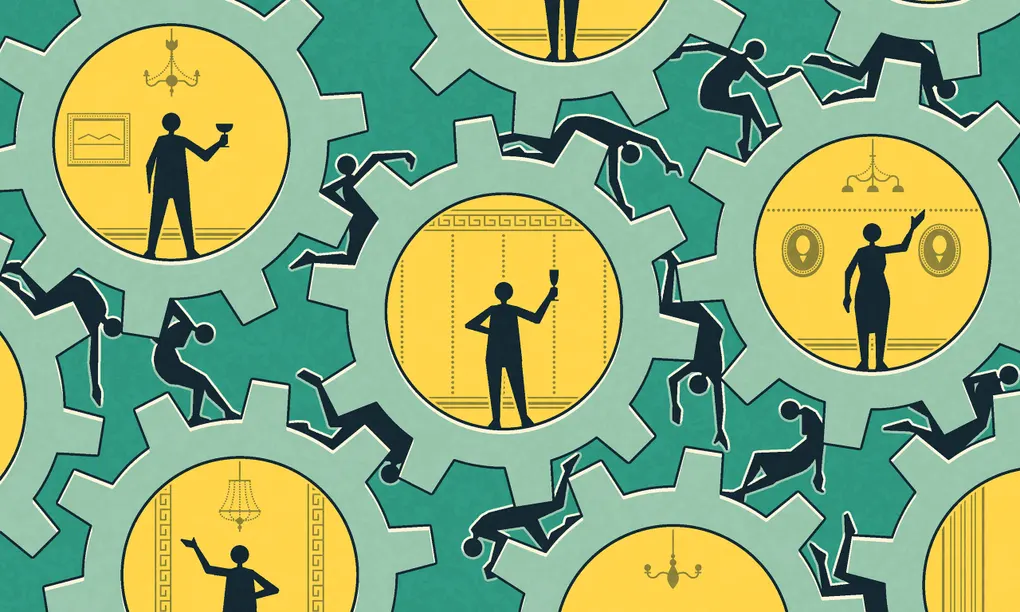Look at How the 1% Are Doing Right Now, and Tell Me the System Isn’t Rigged
CAPITALISM, 30 Jan 2023
Nesrine Malik | The Guardian - TRANSCEND Media Service
The world’s super-rich have amassed so much wealth since the pandemic that even a Tory minister can see something is amiss.
23 Jan 2023 – You may have forgotten by now, but there was a brief moment during the pandemic when hopes were raised for a new “roaring 20s”. The Yale sociology professor Nicholas Christakis predicted that as in the 1920s, after the 1918 Spanish flu, society would embrace indulgence, with a rise in “sexual licentiousness” as well as a “reverse of religiosity”. We were poised to emerge from lockdown randy and flush. We certainly weren’t supposed to plunge, as we have in Britain, right into political crises and strikes, have three prime ministers in as many months, and sit at home too skint to turn on the heating or socialise.
But a roaring 20s is actually happening, just not for most of us. According to Oxfam’s annual inequality report, released to coincide with the World Economic Forum meetings in Davos, the richest 1% of people have captured nearly twice as much new wealth as the rest of the world combined since the pandemic. Their fortune soared by $26tn, increasing their share of new wealth from 50% to two-thirds.
The breakdown of these figures exposes how on a global basis, extreme wealth is accumulated not by innovating or increasing production, but by taking advantage of rising prices and exploiting labour. In this effort, wealthy people are enabled by lack of regulation and taxation. The result is a bonanza of plunder with no sheriff in town.
This has been happening for a while, but the pandemic accelerated the trend. Rich people benefited from everything – every positive intervention from the state and negative impact of the crisis somehow still ended up increasing their wealth. They benefited from rising costs by using them as an alibi to charge higher-than-inflation prices, then distributing the rewards as dividends instead of higher wages. Food and energy corporations made a killing, making $306bn in windfall profits in 2022, then distributing 84% to shareholders.
They benefited from stimulus packages that pushed up asset prices. They benefited from low interest rates that helped them to expand their property empires. According to Credit Suisse, lower interest rates and government support programmes resulted in “a huge transfer” of wealth from the public sector to private households, which saw their debts lowered and the value of their assets, shares and properties, rise.
The obscenity of the system is made possible by the dramatically diminished bargaining power of labour. Weak labour is cheap labour. More lucratively, the world’s workers can increasingly be mobilised according to employers’ precise needs, so not a penny is wasted. The purpose is to transform the human worker into a machine that can be switched off when not in use (although at least machines are tended with maintenance). In 2020, Amazon’s UK sales soared by half to £19.4bn. In 2021, an investigation in Britain found that the company was bypassing its own employment standards by hiring thousands of zero-hours workers through agencies. These workers have no employment protections, their shifts can be cancelled at the last minute, and there is no guarantee of tenure of employment.

Photograph: Nathan Stirk/Getty Images
But it is successful tax avoidance that is the strongest pillar propping up global inequality, and its dismantling would be the quickest solution. There is little chance of that happening soon. Tax regimes, like much of the conventional economic wisdom about the benefits of wealth creation to all, are increasingly out of step with not only the needs of poor people, but with what is required for the health of our economies. The political class has been captured by the outdated ideology of trickle-down economics. And if any of those politicians have dissenting thoughts and consider raising taxes, financial elites threaten to abscond with their wealth, or protest that their entrepreneurial ambitions will be extinguished. The media framing redistributive policies as radical or destructive is a powerful shock collar, too. Oxfam found that 143 of 161 countries actually froze tax rates for the rich during the pandemic, and 11 countries reduced them.
What’s most striking about the post-pandemic profit boom is the truly global nature of the problem. It’s not only the hope of a world recalibrated by Covid towards stronger public infrastructure that is turning to dust in our mouths. An older dream is dying too: of a post-cold-war globalisation that was supposed to bring us all closer, usher in a utopia of free trade, growth, employment and sustainable development. What this model of globalisation ended up achieving was standardising ways for wealthy people to pay as little as possible, concentrating economic activity on those with purchasing power and hanging the rest out to dry. Our lives are indeed becoming more similar across the world. In the global south, affluent people now all have access to the same consumer goods and services, from Netflix to Vitamix, and live in new-build developments with names like Beverly Hills (Cairo), and Bel Air (Nairobi). Poor people are pushed to the margins, the public services they depend on dismantled.
None of this has happened by accident, according to Peter Goodman, the author of Davos Man: How the Billionaires Devoured the World. “It’s not an accident,” he tells me, “that our economies have concentrated greater wealth in fewer hands. Quite simply, wealthy people have used their wealth to purchase democracy, to warp democracy in their own interests. They’ve done that through a global template that involves lowering taxes, privatising formerly public attempts to deal with common problems, liquidating the spending that went into things like social services, and then putting that money into their own pockets.” The main power of the billionaire class, Goodman says, is in their creation of values, not value, that maintain a friendly political climate. Davos, he says, is “a prophylactic against change, an elaborate reinforcement of the status quo served up as the pursuit of human progress”.
But the disparities are becoming too stark for these branding efforts to work as well as they used to. Even rightwing politicians are beginning to point out that the promise of social mobility no longer has purchase. Last week, in a speech that very much sounded like the observations of someone who has awoken from a decades-long slumber, UK cabinet minister Penny Mordaunt said that “many people think things don’t work, at least for them”, adding that “for those with the least, the whole system can seem rigged against them”.
So close and yet so far. The system doesn’t seem to be rigged. It is rigged. I guess it’s a step in the right direction that terms which in the past would have consigned a speaker to the pile of conspiracy theorists and commies are making their way into the mainstream. Mordaunt went further. “The very continuation and success of capitalism,” she said, “hangs in the balance.” But for the powerful tiny minority that owns half the world’s wealth, this sort of capitalism is succeeding better than ever before. What hangs in the balance, as the billionaires’ riches increase, is their ability to argue that it’s working for us too.
______________________________________________
 Nesrine Malik is a Guardian columnist.
Nesrine Malik is a Guardian columnist.
Go to Original – theguardian.com
Tags: Capitalism, Corruption, Elites, Finance, Greed, Hunger, Inequality, Mafia, Organized crime, Post-capitalism, Profits, Right to Food, Super rich, World Order
DISCLAIMER: The statements, views and opinions expressed in pieces republished here are solely those of the authors and do not necessarily represent those of TMS. In accordance with title 17 U.S.C. section 107, this material is distributed without profit to those who have expressed a prior interest in receiving the included information for research and educational purposes. TMS has no affiliation whatsoever with the originator of this article nor is TMS endorsed or sponsored by the originator. “GO TO ORIGINAL” links are provided as a convenience to our readers and allow for verification of authenticity. However, as originating pages are often updated by their originating host sites, the versions posted may not match the versions our readers view when clicking the “GO TO ORIGINAL” links. This site contains copyrighted material the use of which has not always been specifically authorized by the copyright owner. We are making such material available in our efforts to advance understanding of environmental, political, human rights, economic, democracy, scientific, and social justice issues, etc. We believe this constitutes a ‘fair use’ of any such copyrighted material as provided for in section 107 of the US Copyright Law. In accordance with Title 17 U.S.C. Section 107, the material on this site is distributed without profit to those who have expressed a prior interest in receiving the included information for research and educational purposes. For more information go to: http://www.law.cornell.edu/uscode/17/107.shtml. If you wish to use copyrighted material from this site for purposes of your own that go beyond ‘fair use’, you must obtain permission from the copyright owner.
